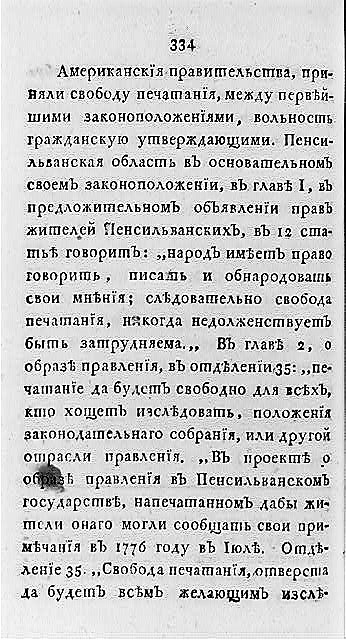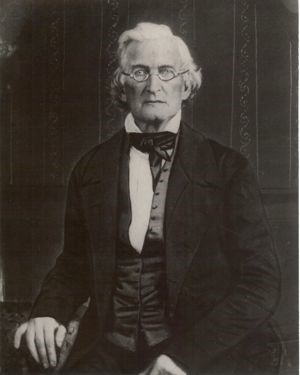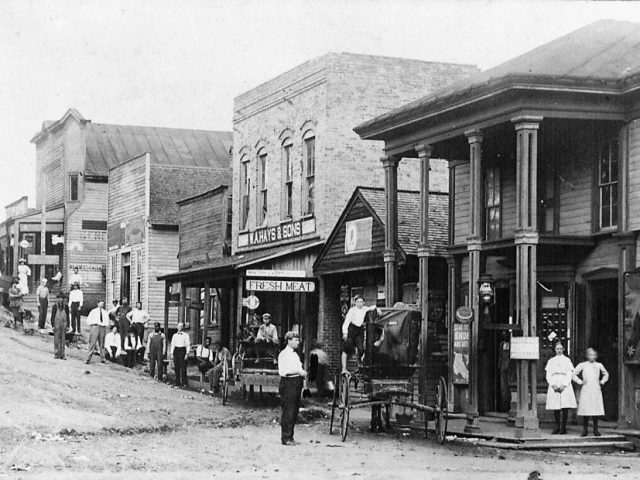“My primary dislike is the wealth of MISINFORMATION generated by well-meaning people, MYSELF included, that somehow remains online even when there is irrefutable proof of the falsehood. This is usually extremely frustrating because of the numbers of originators who are no longer researching and therefore the website of posting will not under any circumstances correct/change the online information.” William G. Bates
Mr. Bates gave me permission to quote the above statement from a recent email where he so succinctly described a significant problem in the cyber world today. While the internet has greatly enhanced the opportunity for information gathering of all types, it has also created many problems. People from all over the world and walks of life have equal access to all stories, news, data, and historical information by merely ‘googling’ any subject online.
Freedom of speech is a Constitutional Right
We are blessed in America with an uncensored freedom of the speech and press according to our Constitution.
“Congress shall make no law respecting an establishment of religion, or prohibiting the free exercise thereof; or abridging the freedom of speech, or of the press; or the right of the people peaceably to assemble, and to petition the government for a redress of grievances.” (U. S. Constitution)
Healthy debate about subjects, pro and con, created democracy and our Constitution ensures that our right of free speech will never be controlled or censored for any part of our society, no matter how much we disagree with another person’s views. President George Washington realized the importance of free speech when he stated:
“If men are to be precluded from offering their sentiments on a matter, which may involve the most serious and alarming consequences that can invite the consideration of mankind, reason is of no use to us; the freedom of speech may be taken away, and dumb and silent we may be led, like sheep, to the slaughter.” (President George Washington, First United States President)
Founders risked their lives
In the United States, each citizen of our great nation has the ability to speak out about wrongs they may see in life or our government. In fact, our rights regarding taxation, government, freedom of religion, speech, and all the other rights listed in our Constitution came about because individual residents in the American Colonies, at the risk of their own death, bravely stood and spoke on soap-boxes, published complaints in pamphlets, printed newspaper stories, and editorials concerning the injustices they had experienced. I imagine that it was for this reason that John Adams, our 2nd president wrote the following about our right to freedom of the press:
“But none of the means of information are more sacred, or have been cherished with more tenderness and care by the settlers of America, than the press.” (John Adams, second U.S. President)
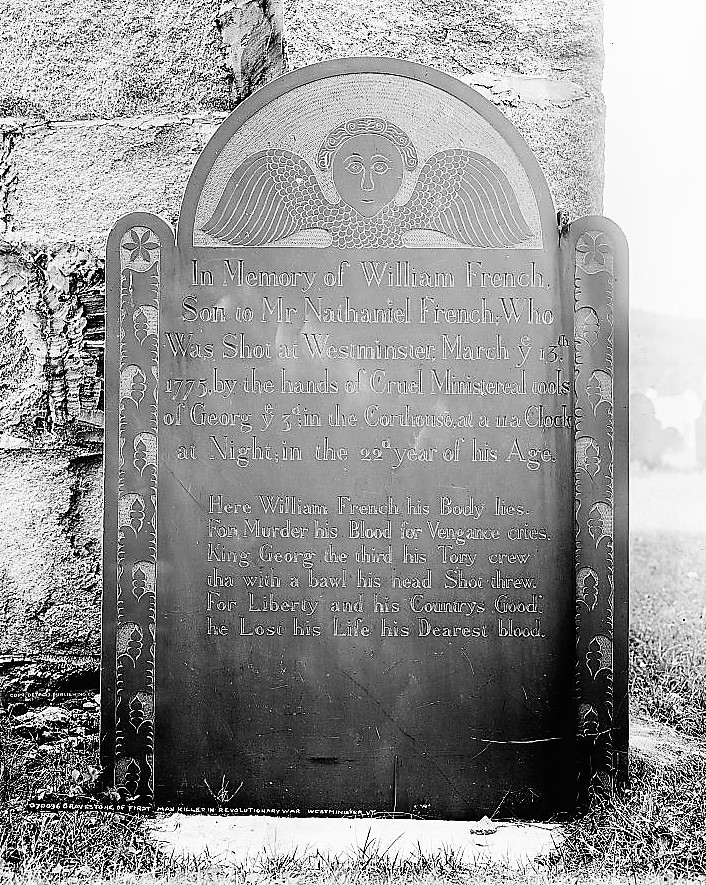 Gravestone of first man killed in Revolutionary War, Westminster, Vt. (ca. 1910 Detroit Publishing, Library of Congress)
Gravestone of first man killed in Revolutionary War, Westminster, Vt. (ca. 1910 Detroit Publishing, Library of Congress)
Right of Free speech is envied by other countries
Speaking out about our grievances with England, eventually, led to a revolt and the Revolutionary War. An uncensored right to speak our mind is one of our most sacred rights, and has distinguished us from other countries in the world. This enviable right for all citizens to examine our leaders through freedom of speech and the press has helped the United States become a world power, because out country has never been ruled by a tyrant.
“Freedom of speech is a principal pillar of a free government: When this support is taken away, the constitution of a free society is dissolved, and tyranny is erected on its ruins. Republics and limited monarchies derive their strength and vigor from a popular examination into the action of the magistrates.” (Benjamin Franklin, United States Founding Father)
Digital Age has expanded this right
The digital age and the internet have given everyone, who has access to the web, the ability to speak his/her mind to the world. This access has also allowed any person to speak on any subject, establish a website, (even anonymously) online, and relate personal views, no matter how outrageous or untrue. Citizens from many countries are now able to participate in discussions via the internet. Since the internet is not censored, many unscrupulous people throughout the United States and the world have taken advantage of this privilege. They have created false stories, articles, etc. to support a personal agenda.
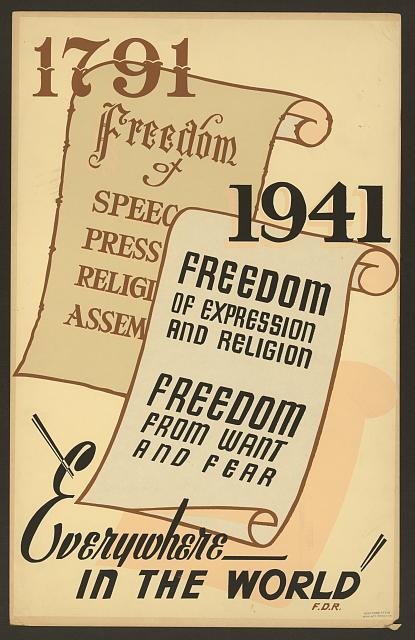 Franklin Delano Roosevelt political poster 1935 (Library of Congress)
Franklin Delano Roosevelt political poster 1935 (Library of Congress)
You endorse stories when you share them
With all the information and news bombarding us daily, it is difficult to determine the stories that are really true. Frequently, untrue stories gain credibility by the sheer volume of shares within social media across the spectrum of the internet.
Do you realize that when you share a story within your social media group, that you are providing tacit approval of the story and an endorsement to all your friends and family? And if you do not provide a reason why you shared it in a statement, as is usually the case on Instagram, Google, Pinterest, or etc., then it is up to your family, friends, and anyone on the internet that may see your shared story, to determine why you shared it. Some reasons could include:
- This is funny, but probably untrue
- This story was so outrageous it couldn’t be true
- You know this the story is true or untrue
- Just wanted you to be aware, I don’t know if it is true
- I like what the story says but I don’t know if it is true
- Totally true, see the source of the story!
- Totally false, see the source of the story!
As you can see, interpretations of why it was shared could be completely different from what you intended but with each share by another person, credibility grows, undeserved or not. This is how totally false or outrageous stories become viral and continue to have some credibility even when proven without a doubt that they are fake.
Many government officials talk about censoring the press and the internet
Today, with news of other countries hacking and influencing the citizens of America via the web, many government officials and well-meaning people have considered censorship of the internet and restricting our right to ‘freedom of the press’. We must protect this precious right in our Constitution or we may lose the basic freedom that made this country great. All citizens must have the right to hear and read all points of an argument and determine the truth for themselves.
President Thomas Jefferson said:
“Our liberty depends on the freedom of the press, and that cannot be limited without being lost. ” (President Thomas Jefferson, U.S. Founding Father)
Censorship is not a new topic and was imposed on correspondence between family members during war time. The poster below from 1941 is suggesting that careless communication may be harmful to the war effort, showing a letter from a soldier stamped “examined by 42.”
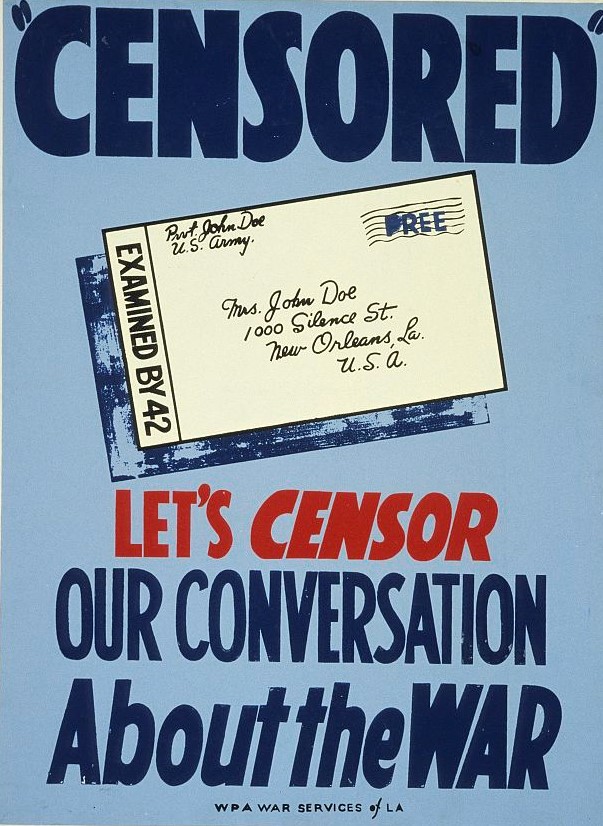 “Censored” Let’s censor our conversation about the war. 1941 (Library of Congress)
“Censored” Let’s censor our conversation about the war. 1941 (Library of Congress)
Censorship was important during World War II
“Government control of the news was comprehensive during WWII. All news about the war had to pass through the Office of War Information (OWI). A “Code of Wartime Practices for the American Press” was issued on Jan 15, 1942 giving strict instructions on proper handling of news. The code was voluntarily adopted by all of the major news organizations and implemented by the more than 1,600 members of the press accredited by the armed forces during the war. The government also relied heavily on reporter’s patriotism, which ensured that in their dispatches from the front lines, they tended to accentuate the positive.” (PBS.org)
The paragraph above states that a code was voluntarily adopted by all the major news organizations to censure themselves. A forced censure was not required. Wouldn’t it be great today if the news media would adopt this practice of voluntarily setting standards to censor themselves again and report only true and verifiable stories.
You have the power to become a part of the solution, not the problem!
Here are some things you can easily do to help find a solution without censoring the internet:
Don’t be naive when reading posts. Read and view all outrageous claims, stories, news stories, twitter comments, pictures, and articles with caution. All website owners know that the more outrageous the picture or story, the more people will read and share it, and possibly make their story go viral.
Don’t share any information you believe to be untrue without making a comment that it is untrue. It is sometimes fun to share an outrageous story or picture, but state that you believe it or know it is false so you don’t inadvertently give the story credibility and add your comments to stories that others share with you. Share a source for your comment if possible. (People sometimes believe the strangest things when it is shared by a person they know and respect) Remember, you have influence in your circle of contacts – don’t send them a false message. They may think you believe a ridiculous story and do you want them to think that about you?
Don’t spread misinformation on important stories that do not have creditable sources. You can do this by simply not sharing stories without verifiable sources within or at the bottom of the story. An article without sources is simply an opinion of the blogger and sadly this has become a practice with good and bad bloggers, especially stories only written on Facebook. A story written without sources indicates that the blog is just the opinion of the writer. It is similar to having a conversation with a complete stranger from anywhere who voices an opinion and has no supporting evidence to back up what they say. Would you normally share such a story with friends? This is why I often transcribe the exact words in excerpts from books, rather than provide a summary. If I provided a summary, I might inadvertently affect the accuracy of the original writer’s voice or intent.
Remember, you have absolutely no idea who is writing anything on the internet and the purpose for writing the article. Anonymity is easy to achieve on the web and is quite frequently used within the cyber-war era, especially with other countries. Don’t inadvertently become a part of a devious plan to influence your circle of contacts.
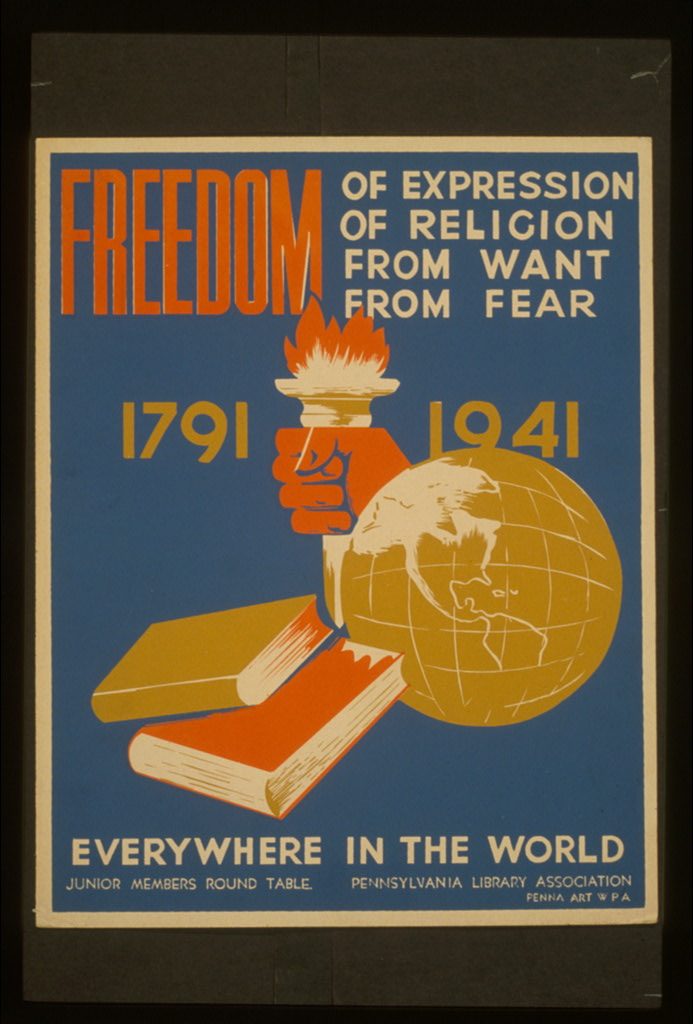 Poster 1941 (Library of Congress)
Poster 1941 (Library of Congress)
Everyone has the right to express an opinion in America
We still must realize that everyone has the right to express himself freely as stated most eloquently below by Henry Steele Commager:
“We cannot have a society half slave and half free; nor can we have thought half slave and half free. If we create an atmosphere in which men fear to think independently, inquire fearlessly, express themselves freely, we will in the end create the kind of society in which men no longer care to think independently or to inquire fearlessly.” (Henry Steele Commager, U.S. Historian)
I recently received a shared item post on Facebook that I really liked. I can no longer find it on my news feed so please email the link if you are the author of the post and I will include it here. I’ll try to describe it.
The post revealed a picture of two men standing opposite a number imprinted on the ground. The number on the ground appeared as a “6” to one man and a “9” to the man standing opposite him. One man argued that the number was 6 while the other man said it was 9. From their individual perspective, both men were correct. However, if the men had only studied other facts around them such as a curbside, street, numbers near the number they were staring at, etc., they could determine who was correct. Neither took the time to study the true facts that would lead them to a correct conclusion. Both men only wanted to be right. Isn’t that the same with most things we see on the internet? We agree with stories that go along with our own preconceived notions and do not take the time to acquire supporting facts that would reveal the truth.
Share stories but read responsibly
I don’t want to discourage sharing stories. Just take a few extra minutes to determine if a story is true, especially news articles before you share it. Sharing is the essence of the internet, and it is often the only means for people who feel they have been left out of society to have a voice.
“If there is any principle of the Constitution that more imperatively calls for attachment than any other it is the principle of free thought — not free thought for those who agree with us but freedom for the thought that we hate.” (Oliver Wendell Holmes Jr., U.S. Supreme Court justice)
We should just be a little more responsible with what we share and/or attach our opinion about a story’s validity. Try taking an extra second to consider the following before you click and share a meaningful story that you enjoyed or may influence others:
- Does the blogger/author have credibility with anyone, organizations, or etc. you respect?
- How accurate have the blogger’s stories been in the past? What is your level of trust?
- Check out any sources provided. -Are they sources you value and believe?
- Click on source links to ensure they are real.
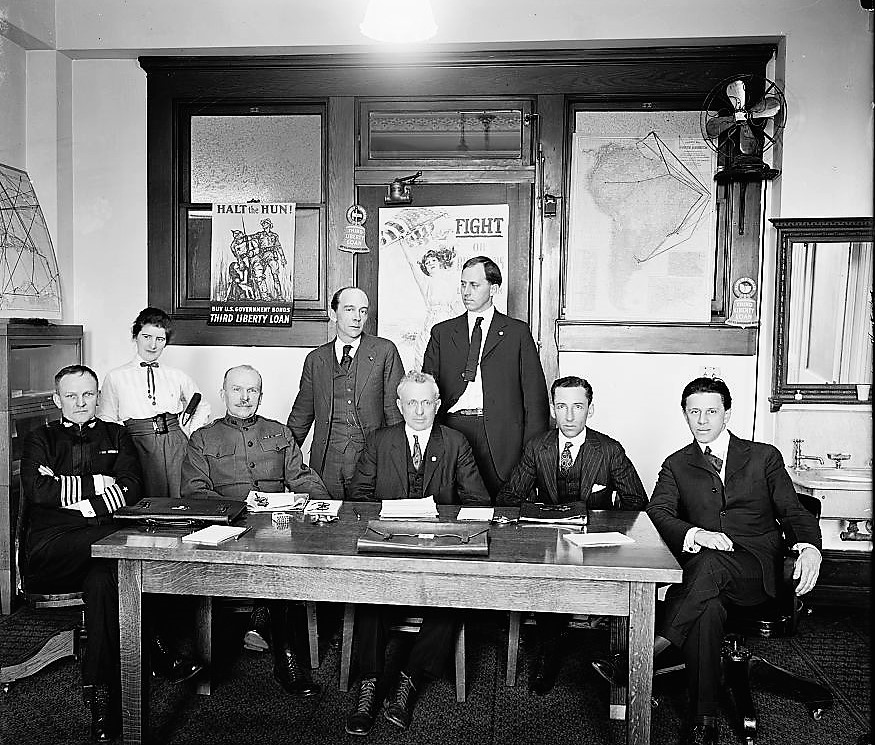 Censorship board 1910 (Library of Congress)
Censorship board 1910 (Library of Congress)
You have an awesome power!
Each person using the internet has the power to influence others, especially within their individual circle of contact. This is an awesome power! But with this power comes a huge responsibility.
We must use our power well or one day, due to fear of cyber-crimes, cyber-wars, etc. our government may attempt to strip our right to freedom of speech and freedom of the press for security reasons.
If we do not protect it, the delicate right to speak our mind in America without censorship can be eroded or taken away like it is in other countries by well-meaning people in power.
“Freedom of conscience, of education, or speech, of assembly, are among the very fundamentals of democracy and all of them would be nullified should freedom of the press ever be successfully challenged. (Franklin D. Roosevelt, 32nd U.S. president)
SOURCE
- The quotes in italics above are from Great American Thinkers on Free Speech The Saturday Evening Post, January 16, 2015
- Photographs – Library of Congress


